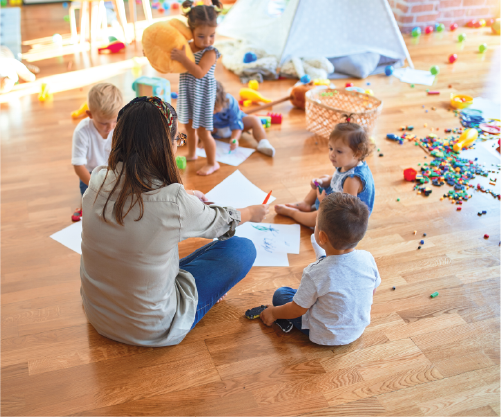 “Let’s not get into it. Why bring back shoddy memories…” chuckles my mom teasingly over the phone.
“Let’s not get into it. Why bring back shoddy memories…” chuckles my mom teasingly over the phone.
Although shocked at her choice of words, I must agree, I was somewhat of a disorganised child. However, when I started living the life of a boarder, being organised was no longer a choice–it was a necessity.
As parents, we should not wait for children to learn organisational skills by mere fluke or necessity. These skills can and should be ingrained within them from the beginning.
Children as early as five years are allowed to be boarders in Bishop Westcott Convent, Ranchi, where Miss J (she wants to be addressed so) was a hostel warden.
I had a short but informative telephonic conversation with her regarding her experience and point of view. The following are a few interesting tactics that we can use from there and the expertise of a few others:
1) In their play-area
“Imbibing good organisational skills is paramount for school life. Especially if they want to succeed here,” says Miss J.
Over her career spanning several years, she has seen children who are naturally inclined towards maintaining order to things but also those who are not inclined towards any kind of organisation whatsoever.
So, what she does about the latter variety? Miss J gives out a few pointers about using playtime. I have segregated and elaborated them for ease of understanding, here.
A-tisket a-tasket…A green and yellow basket…
Although I love nursery rhymes, this point is not about them–it’s about baskets! Miss J suggests using colourful baskets to organise toys especially at the nascent stage of teaching them what being organised means.
“We need to make tasks easy for them. This helps.”
Providing kids with easy means of sorting their things and learning to put toys in order makes life easier. We can grab a couple of colourful baskets for our homes and even teach one-year-olds to arrange things in them
“The foundation has to be simple,” concludes Miss J. I’m sure you agree with her.
My own thing
“Children like to own things,” says Miss J. For that, the school provides personalised labels for each shelf that the kids can use. This way, they want to keep their own shelf tidy and more organised.
We can use the same logic at home and make them ‘house monitors’. This not only applies to the play area but to study time as well.
“We went through months of hard work to plan out our new house. Once done, we made her the house monitor,” says Chhavi, a marketing manager and mother of two. Her seven-year-old is the monitor of their house. Keeping things organised is her job-profile at home!
What’s the point?
When we give them their own areas like shelves, rooms, or cupboards, it creates a sense of responsibility, which in turn sows the seeds of keeping things organised.
Give your child his/her own corner and try this out!
Sing-a-song
During mother-toddler days at my son’s playgroup, the teacher would sing a song after playtime. It went like this: “It’s time to put your toys away; we have something else to do…“
Not only would the kids sing along, but they would also enjoy keeping their toys and playthings in place each time the teachers sang.
Why can’t we make a song at home too? Give it a shot!
Ready to play
“What will it be today?”
Miss J says that we should ask kids this question before they sit down to play. It helps them organise their thoughts and gives structure to playtime as well. Here’s how:
When you sit down to play, you can first ask them to bring out the items that they want to play with. Instead of a let’s play with everything at once approach, choosing one item at a time makes playing more fun. That it makes life more organised, goes unsaid.
2) In their study area
“Let’s eat and sit down to study.”
Mothers say this to children as soon as they return from school. Miss J says that they shouldn’t.
“Studying right after they return from school makes no sense and will not make studying organised, ever!”
So what will?
A fixed timetable
Schedule a fixed study timetable for children. This makes studying more organised.
“Even if all they are doing during this time is colouring or scribbling on sheets of paper, they will learn to sit,” says Miss J. “Focus and getting organised will follow if you catch them young,” she adds.
Organise school stuff
“For six to seven-year-olds, making organised notes is compulsory.”
The warden and other caretakers who assist children with their homework insist upon making organised notes in school.
“A column with the teacher’s exact instructions and another with what you understand of it” is Miss J’s solution to the problem of haphazard school information.
Although most of the information can be shared online today, kids should still be encouraged to jot down class instructions.
Upkeep of stationery
“It’s important to have your stationery well-maintained.”
According to Miss J, children should not be allowed to play unless they have organised their things, especially school stationery, properly. Sharpening pencils, checking if the pens work or not, and other basic things like rulers, erasers, and sharpeners should be maintained.
“Parents should hang a blackboard/marker board for kids to make reminder notes about things that they need to buy for school,” says Miss J.
When I asked her that this is not a possible solution for kids who cannot write properly yet, she said that smaller kids should be verbally instructed to inform their parents.
“Regular reminders help to create a sense of being well-organised,” she concludes.
 3) Finish what you begin
3) Finish what you begin
Ever faced a situation where the homework has begun but has been left midway?
At five, my son makes me experience this for every weekend task. Even if the actual task is finished, noting the date is left for later.
Is it the same for you?
Not completing tasks and chores is like a habit for children. As parents, the first step towards getting them organised is beating this habit.
But how?
Get it tested
Sometimes, the urgency to move to something else without completing the first task comes from marginal calcium deficiency, says Dr Atul Thakare at the Sai Swasthya Homeopathy Clinic, Mumbai.
However, that is nothing to worry about since children need a lot of calcium for their growing bones and teeth and don’t eat properly enough for their body to make that much. Which is why some form of calcium supplement is required for every child.
What after that?
If you are sure that the levels of calcium are intact, or you are on the right track for building the correct levels, move to this next stage.
Divide and rule:
Dr Atul suggests that to combat disorganised behaviour and to teach children to complete their tasks, parents should divide the work into easy steps.
Children like order, provided they understand it.
By keeping instructions to the minimal and dividing tasks into steps, parents can derive orderly behaviour from children. For instance, in my case, where my son does not complete his worksheets, I should divide the work into steps.
- Write your name on the sheet.
- Write the date.
- Complete the actual task.
Children understand the flow of work when it is divided into steps.
Try it for homework, class-work, play-time, or bath time. It’s an open field for you to explore!
4) Appraisal
“Nobody likes someone standing on their head all the time,” says Miss J.
She is talking about keeping a check on whether your child is organised or not. She believes that regular appraisals, at proper intervals, work better than constant instructions.
“So check the toys or books twice a week instead of every day,” she adds.
Instead of giving surprise checks, tell your children that you are going to check how well they have left the bathroom after a bath, their books after studying, and their toys after playing.
Provide fun and constructive feedback. Check once every few days so that they find excitement in being organised.
“Daily instructions are boring and are paid no heed to,” concludes Miss J, leaving me with realisation and a few pangs of guilt.
What the doctor says
Dr Atul hints that the participation of parents in asking their children to be organised should not be based on only instructions, rules, or codes of conduct. The participation should be mutual.
What he suggests is that maybe every weekend, keep a few hours aside to clean the house, check if things are organised or not, and generally work your way to get organised for the coming week.
A few suggestions from his side are:
- Make a food menu for the week and discuss it with them.
- Talk about any upcoming holidays in the week and the plans for the same.
- Talk about pending projects or school work.
- Make a realistic checklist of things that the child wants or needs for the coming week.
By demonstrating order and timeliness in the way we work, we create an organised mindset for them.
5) Time!
I did not need an expert to point this out but every expert and a few parents whom I approached said that punctuality is the stepping stone for leading an organised life.
What does punctuality entail?
According to Monika, mother of a six-year-old, letting children take school timings and bus pick-up timings for granted is the first mistake.
Miss J believes that punctuality comes by displaying the value of time and not pushing it. When parents leave for work, they should not show irritation in being made to stick to a certain time every day (aren’t most of us are guilty of doing this?).
Completing a task well before the deadline is another demonstration of respecting time. Work schedules, study schedules, and fixed play-time are also ways of showing that respecting timelines is paramount.
An activity to your aid
Miss J pointed out a very interesting activity to make children understand and respect time, thereby getting more organised.
She said that children should make their own calendar. Since even three-year-olds are taught about the months of the year in school, making a calendar can be a fun activity for all age groups. The participation of parents should be based on the age and skills of the child. Once the calendar is ready, children should start making notes for important dates.
Not only does that make them more organised and focused, but it also gives them something fun to do.
Plus, it decorates their play-area. Doesn’t it?
The long and short of it
We have gone through a lot of dos and don’ts above, but there is one basic premise under each point. What is that?
The key requirement from your end is assistance. Help your child develop and grow into an organised adult every step of the way. Be patient and involved. Go easy on instructions and overboard with encouragement.
Most importantly, be what you want your child to become.
Do you know other ways in which you can help your child become more organised? Share them with us.
Image Credits: Nori; Evelyngiggles
YOU MAY ALSO LIKE:
Colours: How To Teach Your Toddler To Identify Colours





